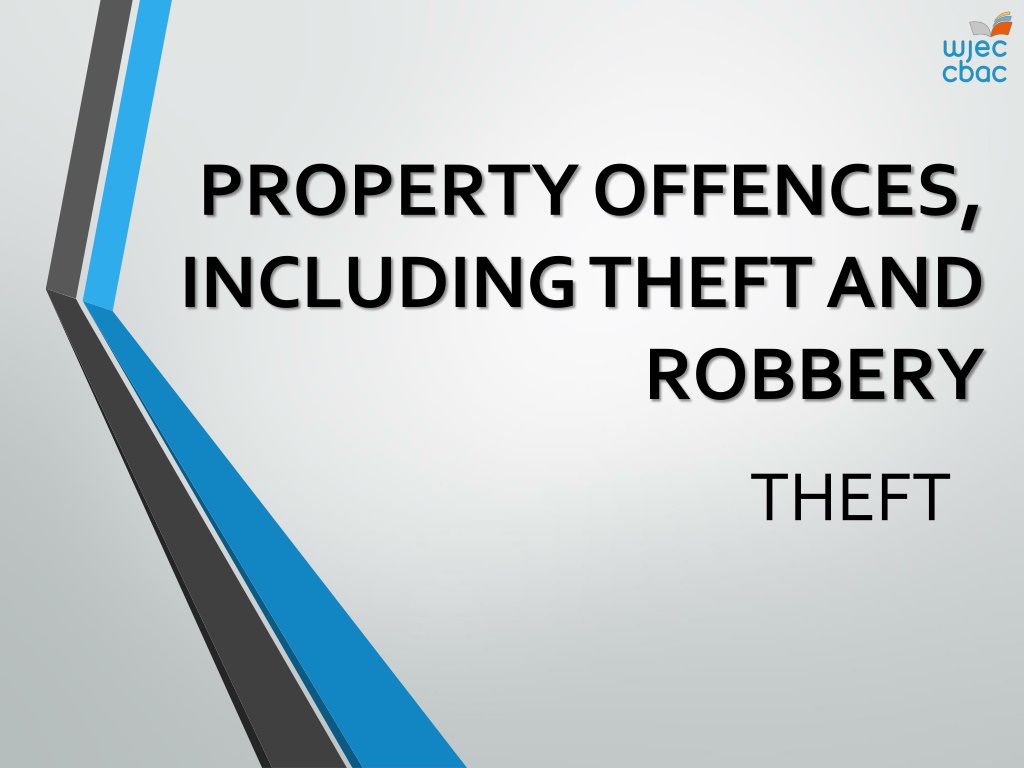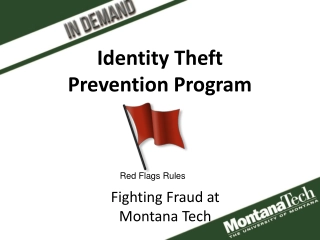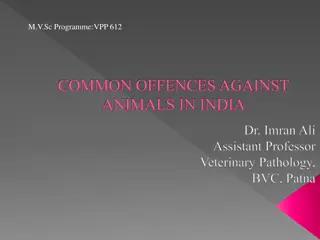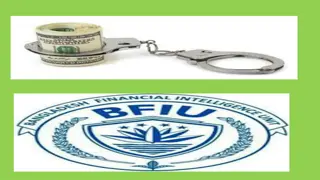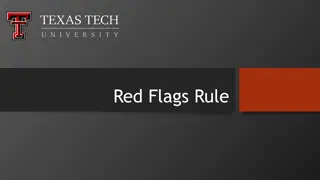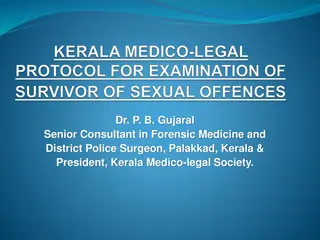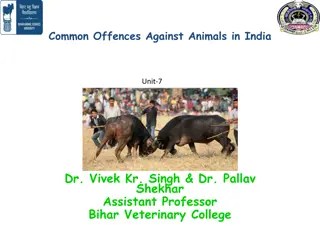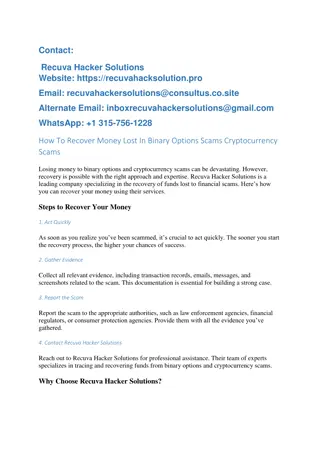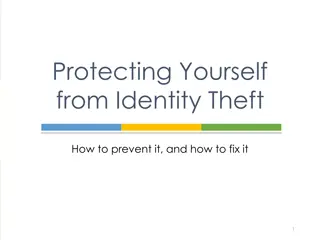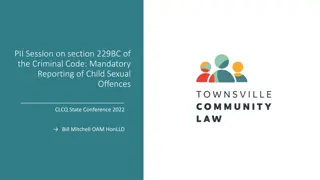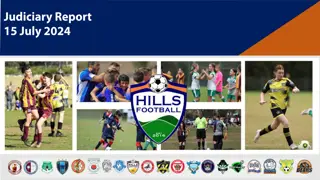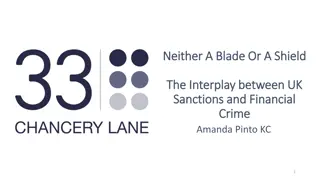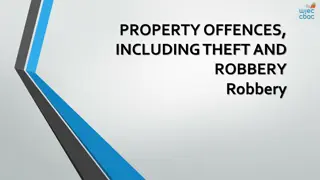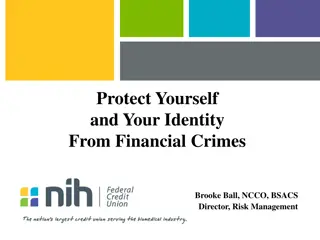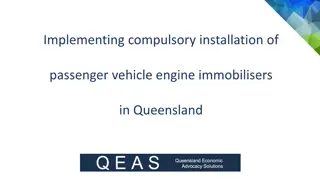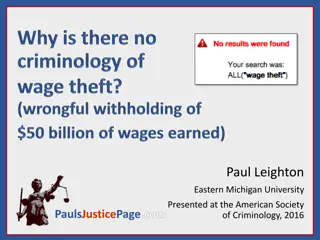Understanding Theft Offences: Elements and Case Law
Theft offences, including theft and robbery, are defined under the Theft Act 1968. A person is guilty of theft if they dishonestly appropriate property belonging to another with the intention to permanently deprive them of it. The elements of theft involve actus reus (appropriation) and mens rea (dishonesty and intention to deprive). Case law, such as R v Pitham and Hehl (1977) and DPP v Gomez (1993), provides insights into appropriation even when the owner consents to the property being taken.
Download Presentation

Please find below an Image/Link to download the presentation.
The content on the website is provided AS IS for your information and personal use only. It may not be sold, licensed, or shared on other websites without obtaining consent from the author. Download presentation by click this link. If you encounter any issues during the download, it is possible that the publisher has removed the file from their server.
E N D
Presentation Transcript
PROPERTY OFFENCES, INCLUDING THEFT AND ROBBERY THEFT
THEFT Section1(1) Theft Act 1968 provides that a person is guilty of theft if they: dishonestly appropriate property belonging to another with the intention to permanently deprive the other of it. Sections 2-6 Theft Act 1968 provide further definitions of each of the above elements of theft. Section 7 sets out the maximum penalty for theft of 7 years. It is a triable either way offence. The elements of theft in section 1 can be broken down into the actus reus and mens rea of the offence.
ACTUS REUS & MENS REA The Actus Reus of theft is: Appropriation Property Belonging to another The MensRea of theft consists of: Dishonesty Intention to permanently deprive
Actus reusof Theft Appropriation The typical theft involves some physical taking, for example, the stealing of your handbag, the taking of your iPad. These incidents are easy to classify as appropriation . You are taking the object from the owner and assuming some or all of their rights. The courts have interpreted this very widely. Appropriation is defined in s.3(1) of the Theft Act 1968: Any assumption by a person of the rights of an owner amounts to appropriation, and this includes, where he has come by the property (innocently or not) without stealing it, any later assumption of a right to it by keeping or dealing with it as owner. Appropriation includes assuming any rights of the owner, e.g. touching, moving, selling, destroying etc.
R v Pitham and Hehl (1977) It also covers later assumption where property has been innocently acquired. For an appropriation to take place, there is no requirement that all the rights of an owner are assumed, one right is sufficient as decided in the case of R v Morris (1983). Roskill LJ It is enough for the prosecution if they proved the assumption of any of the rights of the owner of the goods in question. The concept of appropriation in my view involves not an act expressly or impliedly authorised by the owner but an act by way of adverse interference with or usurpation of those rights.
What if the victim consents to the property being taken? An appropriation can still take place as in the case of Lawrence v MPC (1972). Viscount Dithorne Parliament by the omission of these words (consent) has relieved the prosecution establishing that the taking was done without the owner s consent. Keith LJ said An act may be an appropriation notwithstanding that it is done with the consent of the owner. In another key case, DPP v Gomez (1993), The House of Lords followed the decision in Lawrence v Metropolitan Police Commissioner(1972) confirming that an appropriation can take place with the owner s consent.
R v Hinks (2000): The defendants charge of theft was upheld regardless of it being a gift as the defendant had appropriated the money. What about a later assumption of a right? E.g. you borrow a game from a store and then because you enjoy it, you decide to keep it. Or, you borrow a book from the school library and you never return it. The appropriation takes place when the person decides to keep it. Section 3(1) is clear on this issue.
The next element is Property Defined in s.4 of the Theft Act 1968: Property includes money and all other property, real or personal, including things in action and other intangible property. What about the human body? In the case of R v Kelly and Lindsay (1998) Kelly was an artist. He was given permission to draw anatomical specimens held by the Royal College of Surgeons. The specimens were of various body parts used for training purposes. During the course of his visits he met Lindsay who was a junior technician working for the RCS. Kelly asked Lindsey to remove various body parts over a number of months. These included three human heads, six arms, ten legs part of a brain and three torsos. Kelly made casts of the body parts which were exhibited in an art gallery. Both Kelly and Lyndsey were convicted of theft and appealed contending the body parts did not constitute property lawfully in the possession of RCS. Held: Appeal dismissed. Convictions upheld. The court held that although a dead body was not normally property, the body parts in this case could be as their essential character and value has changed .
Real Property This includes buildings and land. S.4(1) says and can be stolen but only in 3 circumstances. Things in action and intangible property. Intangible property means property that does not exist in a physical sense. A thing in action (also called a chose in action ) is a technical term to describe property that does not physically exist but which gives the owner legal rights that are enforceable by a court action. E.g. a bank account in credit (where the bank refuses the customer their money), investments, shares and intellectual property such as patents etc. People have legal rights over these things but they can t physically hold them.
Oxford v Moss (1979) The courts have decided that some things are not property within the definition. In the case of Oxford v Moss, it was held that theft of exam questions was not theft at all as they were not property . The Divisional Court considered whether confidential information falls within the definition contained in s4(1) of the Theft Act, and were referred to a number of authorities dealing with trade secrets and matrimonial secrets. It was said that although those cases dealt with confidentiality, the appropriate remedies for breach had been injunction or damages rather than criminal penalties. The conclusion was drawn that the definition of "intangible property" was not broad enough to include confidential information, and the prosecutor's appeal was dismissed
Intangible Property s.4(3) A person who picks mushrooms growing wild on any land, or who picks flowers, fruit or foliage from a plant growing wild on any land, does not (although not in possession of the land) steal what he picks, unless he does it for reward or for sale or other commercial purpose. For purposes of this subsection mushroom includes any fungus, and plant includes any shrub or tree. s.4(4) Wild creatures, tamed or untamed, shall be regarded as property; but a person cannot steal a wild creature not tamed nor ordinarily kept in captivity, or the carcase of any such creature, unless either it has been reduced into possession by or on behalf of another person and possession of it has not since been lost or abandoned, or another person is in course of reducing it into possession.
So are there any things that cannot be stolen? So are there any things that cannot be stolen? Yes, is the answer to this question. They are set out in section 4(3) and 4(4) Theft Act 1968. These sections say: s.4(3) A person who picks mushrooms growing wild on any land, or who picks flowers, fruit or foliage from a plant growing wild on any land, does not (although not in possession of the land) steal what he picks, unless he does it for reward or for sale or other commercial purpose.. For purposes of this subsection mushroom includes any fungus, and plant includes any shrub or tree. s.4(4) Wild creatures, tamed or untamed, shall be regarded as property; but a person cannot steal a wild creature not tamed nor ordinarily kept in captivity, or the carcase of any such creature, unless either it has been reduced into possession by or on behalf of another person and possession of it has not since been lost or abandoned, or another person is in course of reducing it into possession.
Electricity Section 11 provides for a separate offence in relation to electricity. It is intangible property that cannot be stolen but if a person (s.11) dishonestly uses electricity without authority or dishonesty causes it to be wasted or diverted then they may be liable for an offence.
The next element is Belonging to another This falls under s.5 Theft Act 1968. The property must belong to another but under s.5 this has a wide meaning. It includes where a person owns the property but also where they have possession or control over it or where they have a proprietary right or interest over it. The wide test is a benefit for the prosecution as they do not have to establish who the legal owner is, just whether the defendant was in possession or control or had a proprietary interest or rights over it.
So what does this mean in practice? Where A has a bag. B steals it. C then steals it from B. C may now be charged with theft from B because B was in possession of it. This is demonstrated in the case of Turner (No2) (1971). A defendant can also be liable for stealing property that the person in possession doesn t even know is there. Woodman (1974).
Proprietary Interest If another person has a proprietary interest in property that a defendant owns and is in possession of then the defendant can be guilty of stealing it! This was the case in Webster (2006) where the Ministry of Justice had retained a proprietary interest in a medal the defendant sold on EBay.
Obligation to Use Property in a particular way. Under section 5(3) it states: where a person receives property from, or on account of another, and is under an obligation to the other to retain and deal with that property or its proceeds in a particular way, the property shall be regarded (as against him) as belonging to the other. E.g. if you gave your teacher a deposit for a class trip but the teacher spent that money on a coffee machine then the teacher has not used the money in the right way so it is theft. In Hall (1972) the Court of Appeal said each case depended on its facts. In this case where was no obligation to use the deposit money in a particular way as it was paid into a general account.
Obligation to use Property in a particular way However, the case of R v Klinebergand Marsden (1999)was distinguished from Hall. In this case, there was a clear obligation to deal with the money in a particular way. This can even be true in less formal situations [e.g. flatmate given money by other flatmate to pay a bill but she spent it on presents Davidgev Bunnett (1984)].
Property acquired by mistake Under section 5(4) there is a duty to make restoration (give it back). If this doesn t happen there may (but not in all cases) be a theft. In the case of AG Ref (No 1 of 1983) (1985) the court held that if there was not an honest attempt to make restoration (i.e. she took a conscious decision not to repay the overpaid salary) then there could be a theft. However the jury acquitted. In the case of R v Gilks (1972) betting transactions are not legally enforceable and so s.5(4) did not apply.
Mens Rea of Theft There are two elements to the Mens Rea: - Dishonesty AND - Intention to permanently deprive
Dishonesty Section 2 (1)A person s appropriation of property belonging to another is not to be regarded as dishonest: (a) if he appropriates the property in the belief that he has in law the right to deprive the other of it, on behalf of himself or of a third person; or (b) if he appropriates the property in the belief that he would have the other s consent if the other knew of the appropriation and the circumstances of it; or (c)(except where the property came to him as trustee or personal representative) if he appropriates the property in the belief that the person to whom the property belongs cannot be discovered by taking reasonable steps. (2)A person s appropriation of property belonging to another may be dishonest notwithstanding that he is willing to pay for the property.
R v Ghosh (1982) R v Ghosh (1982) provides the test for the jury on what is to be regarded as dishonesty. 1. Has the defendant been dishonest by the standards of the ordinary, honest and reasonable person? 2. If the answer is yes, then did the defendant realise that he was dishonest by those standards? If the answer is yes to both questions then the defendant can be legally dishonest.
Intention to permanently deprive This is obvious in some cases e.g. the defendant has spent the stolen cash or sold the car that was stolen but not so obvious in other cases. What if the defendant has stolen cash but intends to replace it? This was the case in R v Velumyl(1989). In this case he was still guilty of theft as he had the intention of permanently depriving the company of the banknotes he had taken.
s.6(1) With the intention of permanently depriving the other of it . A person appropriating property belonging to another without meaning the other permanently to lose the thing itself is nevertheless to be regarded as having the intention of permanently depriving the other of it if his intention is to treat the thing as his own to dispose of regardless of the other s rights. Borrowing or lending of it may amount to so treating it if, but only if, the borrowing or lending is for a period and in circumstances making it equivalent to an outright taking or disposal.
s.6(2) With the intention of permanently depriving the other of it . Without prejudice to the generality of subsection (1) above, where a person, having possession or control (lawfully or not) of property belonging to another, parts with the property under a condition as to its return which he may not be able to perform, this (if done for purposes of his own and without the other s authority) amounts to treating the property as his own to dispose of regardless of the other s rights.
Borrowing something This is not normally a theft because there is no intention to permanently deprive. But, in the case of Lloyd (1985) the court held that borrowing could fall within the ambit of section 6 if the property was borrowed until the goodness, the virtue, the practical value has gone out of the article.
